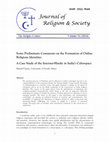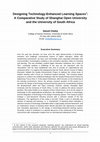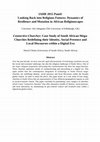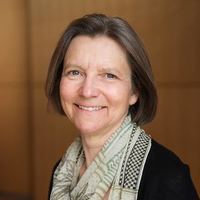Research Papers by Denzil Chetty
Journal for the Study of Religion, 2018
This article primarily outlines the discursive threads in Prozesky’s ‘Implications of Apartheid f... more This article primarily outlines the discursive threads in Prozesky’s ‘Implications of Apartheid for Christianity in South Africa’ in the book he edited, Christianity Amidst Apartheid: Selected Perspectives on the Church in South Africa ([1985] 1990); his first book, Religion and Ultimate Well-Being: An Explanatory Theory (1984); and his latest book, Conscience: Ethical Intelligence for Global Well-Being (2007). This is under three headings: Apartheid as Heresy; Explaining Religion; and Conscience Ethics. We conclude with some appreciative and critical reflections, that we believe, can take Prozesky’s life-long project, further. This is positioned in the social transformation paradigm.

African Journal of Gender and Religion, 2018
Over the past decade, we have witnessed a comic book renaissance. The impact of this renaissance ... more Over the past decade, we have witnessed a comic book renaissance. The impact of this renaissance can be described as threefold. First, we have seen comic books emerge as a compelling component of popular culture; second, as a "hybrid" form of texts and graphics, comic books have attained a new level of literary acceptance; and third, we have seen the advent of comic studies as an academic discipline in various higher education institutions. In addition, by drawing on myth and history, fantasy and reality, comic books have reproduced society's values, ideals, prejudices, and aspirations, thereby producing various ideological contestations. It is within this context that Marvel Comics' latest creation Ms. Marvel (Kamala Khan), portraying a first-generation American Muslim female teenager, born of Pakistani immigrants as the legendary Ms. Marvel-an American superhero-offers a unique opportunity to unpack the socio-cultural and political nuances embedded in comic books. Hence, by drawing on Ms. Marvel (Kamala Khan) as a case study, this paper seeks to provide a critique of the intersections between religion, race and gender in contemporary comic books. To do this, we employ "social constructionism" as an interpretive and analytical theoretical approach to a selection of scenes from the Ms. Marvel corpus. Our hypothesis is that the intersections between religion, race and gender as "played" out in Ms. Marvel (Kamala Khan) serve to foreground a socially constructed reality of religious (Islamic) bigotry; immigrant socio-cultural and political assimilation 1 Johannes A Smit is Professor and former Dean and Head of the School of Religion, Philosophy and Classics at the University of KwaZulu-Natal, South Africa. He is the founding editor of the SAPSE journal Alternation and served as research chair of the Humanities in the early 2000s. He teaches Comparative Religion (focus Christianity), and is the head of the Programme in Religion and Social Transformation since 2002. He has a lifelong commitment to interdisciplinary learning and critical research capacity development in the Arts and Humanities. Email: <Smitj@ukzn.ac.za>. 2 Denzil Chetty is an academic and researcher at the University of South Africa (UNISA) in the College of Human Sciences, School of Humanities, Department of Religious Studies and Arabic. Much of his work focuses on contemporary religion; religion and popular culture; religion, technology and civil society; religion, subalternity and resistance; and the digital humanities. He has published and presented several papers both locally and internationally within this niche. He is also an Abe Bailey Fellow (United Kingdom), a Shanghai Open University Visiting African Scholar (China), and the recipient of UNISA's Excellence in Teaching and Learning Award. Email: <Chettd@unisa.ac.za>. 2 Smit and Chetty predispositions; and gender and power disparities embedded in both Muslim immigrant worldviews (internal) and American social ideals (external).

Post-Apartheid South Africa witnessed a major shift from Christian National Education to a multi-... more Post-Apartheid South Africa witnessed a major shift from Christian National Education to a multi-religion educational approach that sought to treat all religions within an impartial academic context. The National Policy on Religion Education (2003) provided the framework in which the objectives of a multi-religion education found its expression in Life Orientation (Grades R-12) and more fully in the Further Education and Training (FET) Phase with Religion Studies as a subject for Grades 10-12. Through this curriculum transformation, the State aimed to conscientize students to the religious diversity and topical issues within the country, and thereby contribute to the transformation of civil society leading to the materialization of ideal citizens within a democratic society. A decade later while Religion Studies has found a familiar footing among students nationally (i.e. with an increase in student participation in the National Senior Certificate Examinations), concerns on the implementation of the subject are being raised by the Department of Basic Education. Based on a collaborative research initiative with the Gauteng Department of Basic Education (GDBE), this paper aims to explore the challenges confronting educators with the implementation of Religion Studies. 1 FET Phase = Further Education and Training Phase (Grades 10-12).

Over the past decade, we have seen the production of knowledge in the academe undergo fundamental... more Over the past decade, we have seen the production of knowledge in the academe undergo fundamental change. This change has challenged traditional disciplines, practices and policies that form the foundation of established educational institutions. Elements such as the interrelatedness of abstract and applied research, the transdisciplinarity setting, the heterogeneous institutional setting, increased reflexivity (i.e. a more dialogical process), and new ways of assessing the quality of knowledge, have all challenged the type of knowledge produced and facilitated within higher education. Additionally, critical disparities regarding the role of the community and critical stakeholders, and the purpose for which knowledge is produced, have received noteworthy attention. Within this transitioning environment, contradictory impressions of 'social accountability' and 'relevance' continue to place the humanities under a critical lens. It is against this background of purported transitions and increasing theoretical aspirations that the authors problematize and probe the prospects for a contextually relevant epistemology of knowledge production. While cognisant of the many theories and approaches that seek dominance within this field, the authors explore a Gramscian approach of 'organic' knowledge production within the humanities. In so doing, the authors explore the relationship between researchers and the researched through the critical lens of Gramsci's theorizing. This focus supports a critical engagement with the broader social and economic issues of knowledge capital, and offers possibilities for positioning the humanities more critically within the broader domain of knowledge production. Towards Contextually Relevant Epistemology of Knowledge Production 223
The Humanities should be re-imaged in terms of interdisciplinarity and that as a collaborative 'd... more The Humanities should be re-imaged in terms of interdisciplinarity and that as a collaborative 'digital Humanities' in Africa. Where student numbers and financial viability often trump the intellectualization of disciplines, the humanities more often than not find itself victim to higher education 'cut backs'. In addition, major shifts in society, brought about by the recent technology and globalization driven communications revolution, pose serious questions about the continued viability of sole reliance on 'traditional' communication approaches that have preoccupied humanities scholars over the years. Despite these anomalies, there are major attempts within Africa to strengthen and advance the contribution of the humanities to national life and development of the continent,

The growing presence of Hinduism and its adherents in India's cyberspace has led to the conceptua... more The growing presence of Hinduism and its adherents in India's cyberspace has led to the conceptualization of the categorical identity the 'Internet-Hindu.' Using Castell's theorizing of communication in a network society, this paper articulates a critique on the nature of cyberspace and its use by the Hindu community in the construction of online religious identities. The context of this paper derives from the globalization of technology and computer-mediated communication, which brings to the fore an imperative discourse demanding the critique of whether the presence of Hindu adherents in cyberspace is not an emerging paradox. The thesis of this paper is that information and communication technologies are opening up unlimited horizons of creativity and communication, with possibilities of exploring new dimensions of religious identity in online social action and interaction, thereby challenging our societies to engage in a process of structural change. This paper aims to articulate some introductory comments to this crucial area of exploration.
Telephone: +27 (0) 12 429 4055 / +27 (0) 74 182 5099, E-mail: Chettd@unisa.ac.za

Alternation, Dec 2013
Over the past decade, we have seen the advent of technologies (more especially Information and Co... more Over the past decade, we have seen the advent of technologies (more especially Information and Communication Technologies) transforming the higher education landscape. One of the critical challenges emerging within this new landscape has been how to position the integration of technology within an appropriate learning theory. The three 'traditional' learning theories most often utilized in the creation of instructional environments, namely behaviourism, cognitivism and constructivism, have come under much criticism in the design of learning spaces for the twenty-first century learner. One such theorist coming to the fore challenging the presuppositions and relevance of the above three learning theories and offering an alternative approach has been George Siemens with his notion of 'connectivism'. Siemens' connectivism posits that knowledge is distributed across networks and the act of learning is largely one of forming a diverse network of connections and identifying the connected patterns. Hence, my aim in this paper is to ascertain the core principles of Siemens' connectivism, and probe the prospects for a technology-centered pedagogical transition in religious stu-dies. In so doing, I propose the redesigning of learning spaces, where learning is no longer an internal, individualistic activity but an actionable process of gaining knowledge through connecting with specialized 173 information sets that reside within networks of other people, organizations and databases.
alternation.ukzn.ac.za
There are various theories of social interaction that can be used to analyse the current state of... more There are various theories of social interaction that can be used to analyse the current state of Africa, albeit, there is also an inherent need for a theory which can capture the salient factors that perpetuate the state of social conflict that is unique to the African context. Hence, the aim of this research paper is to advance an African discourse that postulates an African born theory of rhetoric in the realm of critical social action. This research paper brings to the fore three important conceptual facets, namely persuasion, religious identity and recognition that have the potential to significantly influence the African social system of interaction. Thus, this paper calls for 1 Harambee (Swahili) = 'pulling together'.
alternation.ukzn.ac.za
Since the promulgation of the National Policy on Religion and Education (2003), Faculties of Educ... more Since the promulgation of the National Policy on Religion and Education (2003), Faculties of Education have worked hard to develop the Religious Component of the Life Orientation curriculum-Religion Education. Schools also started to offer Religion Studies as a full Grade 12 subject. This paper investigates the background to and current state of these developments, some of the thematic focuses on which Religious Studies can impact, and the contours and issues in terms of offering Religion Studies as Grade 12 subject. The article provides a few pointers to important focuses that need further development, such as the articulation of the BA major in Religion with the Religion Education and Religion Studies curricula.
This book focuses on reconciling the apparently irreconcilable differences of the Biblical texts ... more This book focuses on reconciling the apparently irreconcilable differences of the Biblical texts that allow divorce and those prohibit divorce. Although, the New Testament references to divorce were ambiguous enough to prevent a rapid consensus within the Church that ...
Research Proposals by Denzil Chetty

Over the past two decades, we have seen the rapid advancements of technology transform and challe... more Over the past two decades, we have seen the rapid advancements of technology transform and challenge conventional notions of higher education. Within this transforming environment, we have seen technology (more especially Information and Communication Technologies) enabling a new innovative education milieu for teaching and learning. This has inevitably, pushed higher education institutions into a state of “flux”, constantly positing a redefining of the way we “do education” and the “boundaries” that we have established over time to provide an organizational and contextual ethos. It is against this background that the South African Council of Higher Education initiated the Quality Enhancement Project to address the critical issue of student retention with a focus on “enhanced student learning”. This research project proposes to continue the institutional dialogue with the Quality Enhancement Project by addressing “Focus Area 3” of the project framework, which focuses on the enhancing of the learning environment. Hence, the primary research question of this project is to ascertain the design of technology-enhanced learning spaces by comparatively studying the developments within two Open University contexts, namely. Shanghai Open University and the University of South Africa. In order to address the above research question, this project builds on an analysis of three critical issues, vis-à-vis the impact of technology on the organizational architecture; the challenges of access to technology; and the integration of technology in the design of learning spaces. This research project employs a semi-structured interview process with a selective sample of the two institutions. The significance of this study is two-fold. Firstly, it aims to articulate two streams of teaching and learning, i.e. a “mainstream” of teaching which embodies a selective amount of technology embedded within a rigid quality assured framework; and an “exploratory” stream of teaching which affords educators the opportunity to explore new innovative approaches to the design of technology-enhanced learning spaces. Secondly, it aims to contribute to a national discourse on the enhancing of the learning environment with comparative insights from an international institutional context.
Conference Presentations by Denzil Chetty
Reports on International Research Visits by Denzil Chetty
Conference Abstracts by Denzil Chetty

Over the past decade, we have seen the rapid advancements of technology transform not just the so... more Over the past decade, we have seen the rapid advancements of technology transform not just the social and economic landscape, but also the religious landscape of South Africa. One of the major religious proponents advocating this transformation has been the mega-churches. These churches epitomize modes of communicating and networking in a digital era. This paper probes how the contemporary integration of technology in South African megachurches are redefining identity, social presence and local discourses within the broader global context. In order to attain the above, this paper draws on a case study of four megachurches in South Africa that are representative of four different geographical regions as well as social-economic classes. This paper concludes by postulating a new category of churches, which I term "connective churches" that offer alternative models of identity, social presence, and local discourses, by maintaining its geo-cultural context and localized traits within a digitalized global milieu.
Journal Editorials by Denzil Chetty
Book Reviews by Denzil Chetty
Digital Culture and Religion in Asia
By Sam Han and Kamaludeen Mohamed Nasir
London and New York:... more Digital Culture and Religion in Asia
By Sam Han and Kamaludeen Mohamed Nasir
London and New York: Routledge
2016, 129 pages. ISBN: 978-0-415-52185-7
Reviewer: Denzil Chetty, University of South Africa











Uploads
Research Papers by Denzil Chetty
Research Proposals by Denzil Chetty
Conference Presentations by Denzil Chetty
Reports on International Research Visits by Denzil Chetty
Conference Abstracts by Denzil Chetty
Journal Editorials by Denzil Chetty
Book Reviews by Denzil Chetty
By Sam Han and Kamaludeen Mohamed Nasir
London and New York: Routledge
2016, 129 pages. ISBN: 978-0-415-52185-7
Reviewer: Denzil Chetty, University of South Africa
By Sam Han and Kamaludeen Mohamed Nasir
London and New York: Routledge
2016, 129 pages. ISBN: 978-0-415-52185-7
Reviewer: Denzil Chetty, University of South Africa